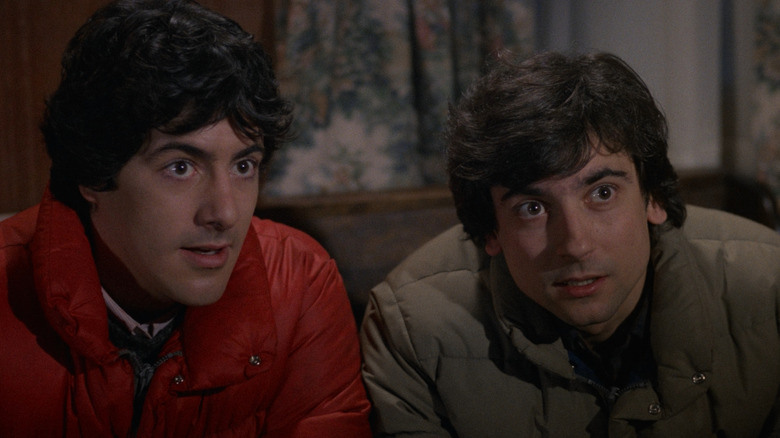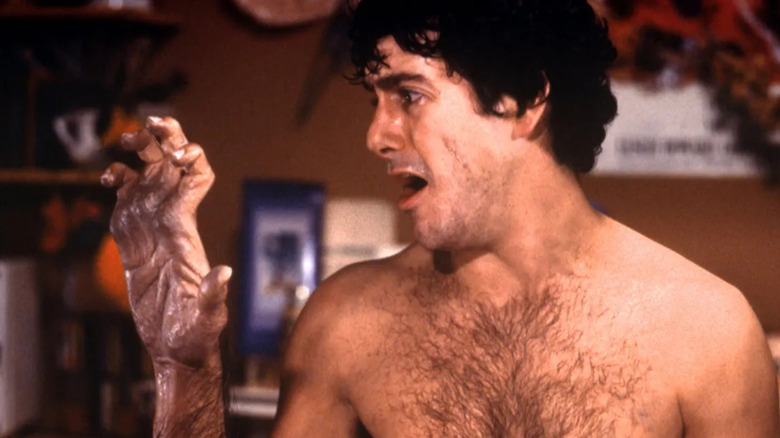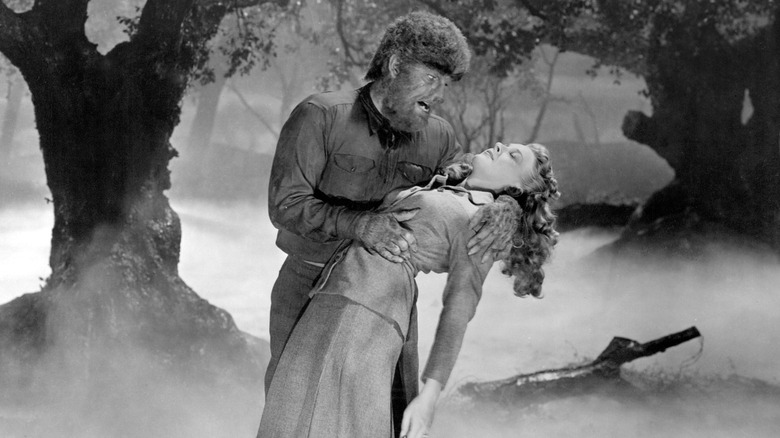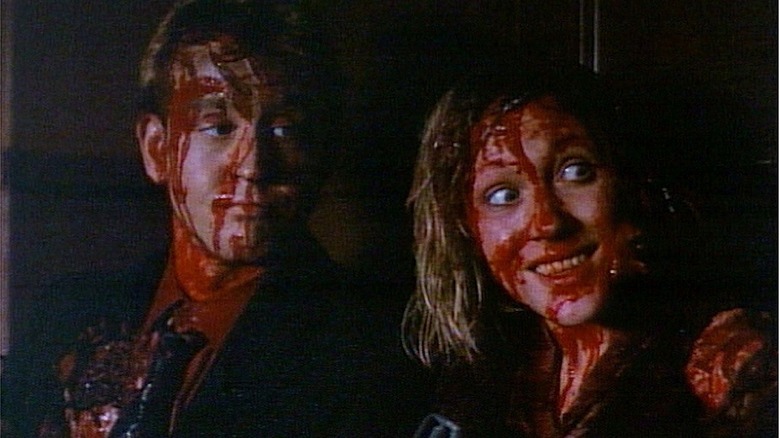An American Werewolf In London Traces Its Roots To A 1940s Monster Movie Classic
41 years after its release in theaters, John Landis' "An American Werewolf in London" seems nearly as modern today as it did in 1981. That's partly because the script wasn't even a product of its own time — Landis came up with the idea in the late '60s, while working on "Kelly's Heroes" as a PA in Yugoslavia. After witnessing a "gypsy funeral," the 18-year-old Landis was taken with the clash between his so-called civilized background and the fervent belief in superstition and the supernatural he witnessed at the funeral.
As the young Landis began his directing career in earnest during the '70s, he kept trying to get "American Werewolf" made, to no avail. Not only was this due to his relative inexperience early in his career (which the subsequent success of "Kentucky Fried Movie," "National Lampoon's Animal House," and "The Blues Brothers" changed), but people who read the "Werewolf" script were confused by its blend of humor and horror.
To be sure, that blend may have been a little offbeat for the '70s and early '80s, especially given how "American Werewolf" became the vanguard for a lot of horror comedies that were as unsettling as they were funny (unlike the prior, broader comedies featuring horror characters that starred comedians like Abbott and Costello and Bob Hope). Yet in retrospect, it's still surprising that "American Werewolf" took so long to get howling, because Landis deliberately made the film a homage to the quintessential werewolf movie: 1941's "The Wolf Man."
An American Schmuck-wolf
The concept of the werewolf was certainly not created from whole cloth. The writer of "The Wolf Man," Curt Siodmak, was drawing on a number of ancient legends and folklore (including, of course, the mental condition known as lycanthropy). There had also been a number of stories in various media about werewolves, including a film produced by Universal Studios in 1935: "Werewolf of London."
Yet Siodmak's script for "The Wolf Man" established the tenets of the modern werewolf mythos. Where "Werewolf of London" (which was certainly at least a partial inspiration for which city Landis decided to set his script in) had a premise where becoming a werewolf involved magic flowers and what not, "The Wolf Man" told the story of poor Larry Talbot (Lon Chaney Jr.) who visits a land he's unfamiliar with, and has the bad luck of being scratched by another werewolf before that creature is killed. Thus, the curse of uncontrollably transforming into a monster under the light of the full moon then passes to Larry.
"The Wolf Man" makes it clear that Larry's plight is a tragedy, and it's that approach Landis adopted for "American Werewolf." As the writer/director explained in a 2017 interview with The Guardian, "My inspiration was the old 1940s horror movie 'The Wolf Man,' starring Lon Chaney, in which — unusually — the werewolf was portrayed as a victim."
In another interview filmed for the movie's various home video releases, Landis elaborated further, declaring that "Ultimately, the poor werewolf is such a schmuck," and the use of that Yiddish pejorative is incredibly apt for the character of David Kessler (David Naughton). As Landis goes on to say, "the guy cannot win."
Landis pays homage to The Wolf Man
Although Landis was prone to feature clips of classic movies within the body of his features, "An American Werewolf in London" contains no actual footage from "The Wolf Man." This may have been Landis' decision all along, given that his movie follows "The Wolf Man" and its concept of the werewolf mythos so closely. Yet it also may be because of another landmark werewolf movie released in 1981: Joe Dante's "The Howling," which does indeed make use of "Wolf Man" footage.
Instead, Landis includes a number of references to the classic. Early on, there's a moment where Jack (Griffin Dunne) spots a pentagram in a pub, mentioning it being a plot point from "The Wolf Man." Later, there's a scene in which poor, doomed David and his Florence Nightingale-esque lady love, Alex (Jenny Agutter), discuss "The Wolf Man" while in bed. That scene has multiple functions: bringing David and Alex closer as the man latently declares his love for her, setting up the film's "King Kong"-esque tragic ending, paying tribute to the classic which Landis drew a lot of inspiration from, and establishing that civilization/superstition dynamic: both David and Alex are able to distance themselves from believing in David's curse because there have been fictional movies made on the subject.
There's also a sly reference to another tragic werewolf movie in the scene: Alex's confusion about which movie David is discussing has her mention "the one with Oliver Reed," which is a reference to Hammer Films' "The Curse of the Werewolf" from 1961, which stars Reed as a similarly doomed lycanthrope.
Tragedy = comedy + fangs
While "The Wolf Man" never plays its events for laughs, there is an inherent cynical humor to the film. Larry Talbot may as well be a fall guy protagonist from a film noir, and just as in those films, his doomed nature is almost as funny as it is sad.
Landis capitalizes on that latent humor in "American Werewolf," turning it up to 11. David isn't the only doomed character who gets to voice his displeasure at his fate: there are also his many innocent victims who haunt him in visions during the day, not to mention David's poor dead friend Jack, who can't stop whining about how boring the afterlife is.
Ultimately, what makes "An American Werewolf in London" such a great homage to director George Waggner's "The Wolf Man" lies not in its direct references or Landis borrowing elements of the Siodmak script for his movie. It's in the tonal approach, as the film makes the werewolf a creature to be pitied as well as feared. It unlocks the fear inside all of us as we realize how relatable the creature's bad luck and uncontrollable urges are. Our lives may be unlucky or stressful for reasons of our own making and otherwise, but — as both films seem to imply — at least we're not that much of a schmuck!



